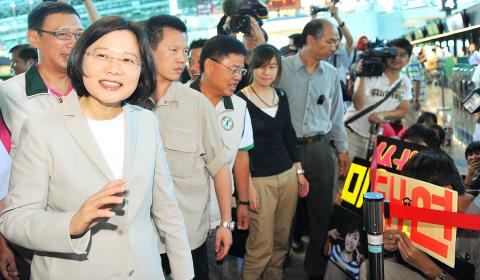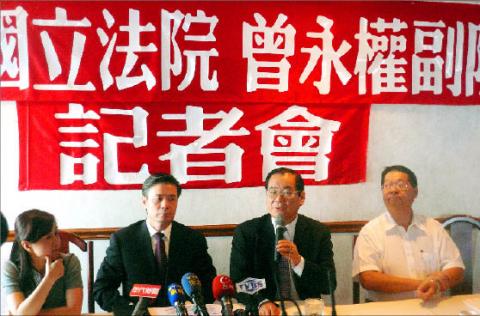Democratic Progressive Party (DPP) Chairperson Tsai Ing-wen (蔡英文) left for the US yesterday in an effort to drum up support for her presidential campaign.
At Taiwan Taoyuan International Airport, Tsai said the aim of her visit was to exchange opinions with people in the US and to establish a communication mechanism with the US administration.
If the DPP returned to power next year, the party and Taiwan could have a relationship of mutual confidence and mutual benefit with the US, and both countries could cooperate in maintaining stability in the Asia-Pacific, she said.

Photo: Yao Chieh-hsiu, Taipei Times
Tsai’s running mate, DPP -Secretary-General Su Jia-chyuan (蘇嘉全), as well as several DPP officials, saw her off at the airport.
Tsai is expected to meet US Department of State officials, including US Deputy Secretary of State for Management and Resources Thomas Nides and US Assistant Secretary of State for East Asian and Pacific Affairs Kurt Campbell, to discuss Taiwan-US and Taiwan-China relations.
Asked to comment on an interview that President Ma Ying-jeou’s (馬英九) re-election campaign office executive director King Pu-tsung (金溥聰) gave to Hong Kong-based Phoenix Television, in which King talked about the possibility of Ma visiting China, Tsai said: “A president visiting China is a very serious matter, which should be discussed by Ma himself, not a campaign official. It is a breach of government protocol.”

Photo: CNA
King, who is on a six-city tour of the US, told the TV channel that Ma did not rule out a visit to China if he were re-elected in January. Ma would make the visit in his role as Chinese Nationalist Party (KMT) chairperson, King said.
“Once the two sides have developed a tacit understanding and are capable of setting aside disputes and solving bilateral issues in a practical manner, the likelihood of this and addressing further issues improves,” King said.
“The two sides may hold more dialogues on daily affairs, culture, sports, the economy and even politics,” he said.
Given King’s controversial actions and remarks on his US trip thus far, Ma should restrain King, Tsai said.
“Mr King has recently talked about many important national affairs. I want to remind President Ma that he is running in the presidential election, not King Pu-tsung,” Tsai said.
However, Ma’s spokesman Fan Chiang Tai-chi (范姜泰基) played down King’s comments.
“As of now, there’s no such plan,” he said of the suggested cross-strait trip.
Tsai is scheduled to spend three days in Washington, where she will meet academics from several think tanks and members of Congress, as well as attend fundraising dinners organized by overseas Taiwanese communities. She will then make a short trip to Boston to give a speech at Harvard University.
After Boston, Tsai’s delegation will travel to New York City for a fundraising dinner organized by overseas Taiwanese before moving on to Houston, San Francisco and Los Angeles, which boast some of the largest Taiwanese communities in the US.
Meanwhile, King rebuffed accusations by the DPP over the weekend that his US trip was meant to “sabotage or ambush” Tsai’s visit. He said the very -suggestion was “childish.”
King told a press conference in Washington that the KMT delegation, headed by Deputy Legislative Speaker Tseng Yung-chuan (曾永權), was making the visit at the request and invitation of Taiwanese supporters of the KMT in the US.
When these KMT supporters heard that Tsai was going to visit the US, they wanted Ma to send a delegation as well so that they could express their support.
“We are here in response to the requests of people who live here,” King said.
King said there was no question of a competition with Tsai to see who could meet the more senior US officials. The KMT delegation just wanted to meet officials in charge of Asian affairs to explain Ma’s cross-strait policies and his push for a “win-win situation,” King said.
The KMT delegation arrived in Washington three days ahead of Tsai and will visit the same cities on her itinerary: Washington, New York, Boston, Houston, San Francisco and Los Angeles. While the schedules are very similar, these cities do have large Taiwanese emigre populations.
At Harvard on Thursday, King and Tsai will appear within two hours of each other. Both are expected to hold talks with Nides and Campbell.
“We want to tell our American friends that the policies of President Ma are more pragmatic than those of the DPP,” King said.
“We are moving toward a better future. The Ma government has spared no effort to improve all the domestic and economic situations and cross-strait relations,” he said.
Tseng played down the controversy over US beef imports and indicated that it would not be a major issue in the KMT delegation’s talks in Washington.
When asked if Ma would visit China if he were reelected, King said as long as Taiwan’s sovereignty and dignity were not undermined, anything “might be possible or be discussed.”
He said that he had been quoted “out of context” in reports that Ma would make such a visit and he refused to confirm whether Ma would go or not.
Another war of words between the DPP and KMT erupted yesterday over reports that Taiwanese businesspeople working in China might receive discounted air tickets to return home to vote in January’s presidential and legislative elections.
Before leaving Taipei, Tsai said determining the motivation for the discounted fares was crucial. If someone were subsidizing the discounts, then vote buying could be involved and law enforcement officials should handle the matter, she said.
However, KMT Culture and Communication Commission Director Chuang Po-chun (莊伯仲) said the discount airfare scheme was being promoted by China-based Taiwanese business associations of their own accord.
“It has been routine for many years for the associations to take the initiatives to negotiate package deals for cheaper airline tickets,” he said.
It was beneath Tsai’s dignity to make groundless vote-buying accusations against Ma and made her look like she lacked common sense, Chuang said.
Not all businesspeople based in China would vote for the KMT, Chuang said.
Additional reporting by Shih Hsiu-chuan, AFP and CNA

The CIA has a message for Chinese government officials worried about their place in Chinese President Xi Jinping’s (習近平) government: Come work with us. The agency released two Mandarin-language videos on social media on Thursday inviting disgruntled officials to contact the CIA. The recruitment videos posted on YouTube and X racked up more than 5 million views combined in their first day. The outreach comes as CIA Director John Ratcliffe has vowed to boost the agency’s use of intelligence from human sources and its focus on China, which has recently targeted US officials with its own espionage operations. The videos are “aimed at

STEADFAST FRIEND: The bills encourage increased Taiwan-US engagement and address China’s distortion of UN Resolution 2758 to isolate Taiwan internationally The Presidential Office yesterday thanked the US House of Representatives for unanimously passing two Taiwan-related bills highlighting its solid support for Taiwan’s democracy and global participation, and for deepening bilateral relations. One of the bills, the Taiwan Assurance Implementation Act, requires the US Department of State to periodically review its guidelines for engagement with Taiwan, and report to the US Congress on the guidelines and plans to lift self-imposed limitations on US-Taiwan engagement. The other bill is the Taiwan International Solidarity Act, which clarifies that UN Resolution 2758 does not address the issue of the representation of Taiwan or its people in

US Indo-Pacific Commander Admiral Samuel Paparo on Friday expressed concern over the rate at which China is diversifying its military exercises, the Financial Times (FT) reported on Saturday. “The rates of change on the depth and breadth of their exercises is the one non-linear effect that I’ve seen in the last year that wakes me up at night or keeps me up at night,” Paparo was quoted by FT as saying while attending the annual Sedona Forum at the McCain Institute in Arizona. Paparo also expressed concern over the speed with which China was expanding its military. While the US

SHIFT: Taiwan’s better-than-expected first-quarter GDP and signs of weakness in the US have driven global capital back to emerging markets, the central bank head said The central bank yesterday blamed market speculation for the steep rise in the local currency, and urged exporters and financial institutions to stay calm and stop panic sell-offs to avoid hurting their own profitability. The nation’s top monetary policymaker said that it would step in, if necessary, to maintain order and stability in the foreign exchange market. The remarks came as the NT dollar yesterday closed up NT$0.919 to NT$30.145 against the US dollar in Taipei trading, after rising as high as NT$29.59 in intraday trading. The local currency has surged 5.85 percent against the greenback over the past two sessions, central